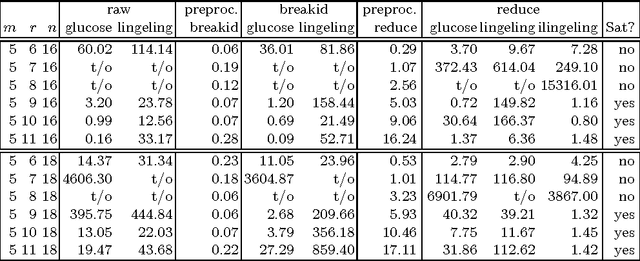Tommi Junttila
Aalto University, Department of Computer Science
An adaptive prefix-assignment technique for symmetry reduction
Sep 08, 2018
Abstract:This paper presents a technique for symmetry reduction that adaptively assigns a prefix of variables in a system of constraints so that the generated prefix-assignments are pairwise nonisomorphic under the action of the symmetry group of the system. The technique is based on McKay's canonical extension framework [J.~Algorithms 26 (1998), no.~2, 306--324]. Among key features of the technique are (i) adaptability---the prefix sequence can be user-prescribed and truncated for compatibility with the group of symmetries; (ii) parallelizability---prefix-assignments can be processed in parallel independently of each other; (iii) versatility---the method is applicable whenever the group of symmetries can be concisely represented as the automorphism group of a vertex-colored graph; and (iv) implementability---the method can be implemented relying on a canonical labeling map for vertex-colored graphs as the only nontrivial subroutine. To demonstrate the practical applicability of our technique, we have prepared an experimental open-source implementation of the technique and carry out a set of experiments that demonstrate ability to reduce symmetry on hard instances. Furthermore, we demonstrate that the implementation effectively parallelizes to compute clusters with multiple nodes via a message-passing interface.
 Add to Chrome
Add to Chrome Add to Firefox
Add to Firefox Add to Edge
Add to Edge